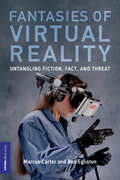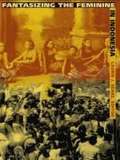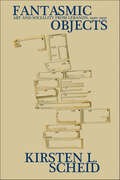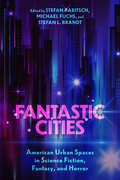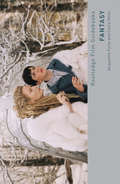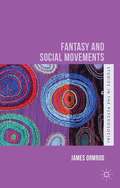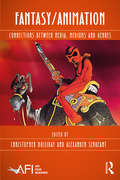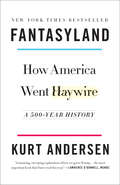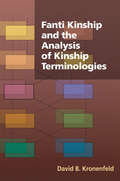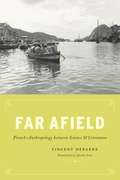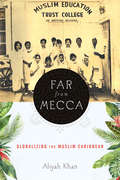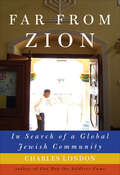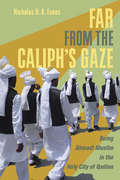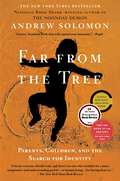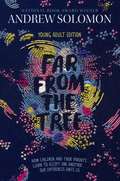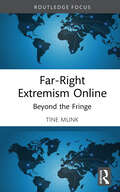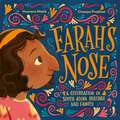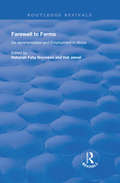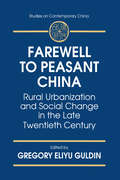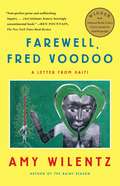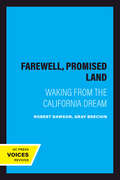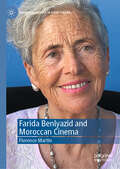- Table View
- List View
Fantasies of Virtual Reality: Untangling Fiction, Fact, and Threat (Strong Ideas)
by Marcus Carter Ben EglistonThe fantasies that underpin common perceptions of Virtual Reality—and what we need to know about VR&’s potential risks as well as its opportunities.Virtual reality is the next new frontier for Silicon Valley. Mark Zuckerberg, who has overseen Meta&’s investment of billions into VR, pitches it as the next dominant computing paradigm. More than just a gaming technology, VR is top of mind for academics, tech reportage, and industry evangelists who all see the potential for VR to revolutionize fields such as education and health, as well as the way we work and communicate. But will VR achieve all this? In Fantasies of Virtual Reality, Marcus Carter and Ben Egliston strip bare the tech industry&’s vision of a future dominated by immersive VR experiences, challenging the utopian promises of this technology&’s potential.Carter and Egliston offer a critical account of VR in a variety of contexts, from gaming to human resources to policing and the military. They argue that while VR does hold significant potential, the overhyped expectations surrounding it, from achieving true empathetic understanding to transforming traditional education and office work, are often overstated and fraught with issues of privacy, control, and exclusion. What&’s more, there is nothing truly virtual about virtual reality: VR is deeply entrenched in the material world, driven by tangible technological, economic, and social logics.An accessible introduction to this emerging technology, Fantasies of Virtual Reality is essential reading for anyone interested in what VR can really do—and what is just plain fantasy.
Fantasies of the Master Race: Literature, Cinema and the Colonization of American Indians
by Ward Churchill M. Annette JaimesIn this volume of incisive essays, Ward Churchill looks at representations of American Indians in literature and film, delineating a history of cultural propaganda that has served to support the continued colonization of Native America. During each phase of the genocide of American Indians, the media has played a critical role in creating easily digestible stereotypes of Indians for popular consumption. Literature about Indians was first written and published in order to provoke and sanctify warfare against them. Later, the focus changed to enlisting public support for "civilizing the savages," stripping them of their culture and assimilating them into the dominant society. Now, in the final stages of cultural genocide, it is the appropriation and stereotyping of Native culture that establishes control over knowledge and truth.
Fantasizing the Feminine in Indonesia
by Laurie J. SearsThe stories of Indonesian women have often been told by Indonesian men and Dutch men and women. This volume asks how these representations--reproduced, transformed, and circulated in history, ethnography, and literature--have circumscribed feminine behavior in colonial and postcolonial Indonesia. Presenting dialogues between prominent scholars of and from Indonesia and Indonesian women working in professional, activist, religious, and literary domains, the book dissolves essentialist notions of "women" and "Indonesia" that have arisen out of the tensions of empire.The contributors examine the ways in which Indonesian women and men are enmeshed in networks of power and then pursue the stories of those who, sometimes at great political risk, challenge these powers. In this juxtaposition of voices and stories, we see how indigenous patriarchal fantasies of feminine behavior merged with Dutch colonial notions of proper wives and mothers to produce the Indonesian government's present approach to controlling the images and actions of women. Facing the theoretical challenge of building a truly cross-cultural feminist analysis, Fantasizing the Feminine takes us into an ongoing conversation that reveals the contradictions of postcolonial positionings and the fragility of postmodern identities. This book will be welcomed by readers with interests in contemporary Indonesian politics and society as well as historians, anthropologists, and other scholars concerned with literature, gender, and cultural studies.Contributors. Benedict R. O'G. Anderson, Sita Aripurnami, Jane Monnig Atkinson, Nancy K. Florida, Daniel S. Lev, Dédé Oetomo, Laurie J. Sears, Ann Laura Stoler, Saraswati Sunindyo, Julia I. Suryakusuma, Jean Gelman Taylor, Sylvia Tiwon, Anna Lowenhaupt Tsing, Diane L. Wolf
Fantasmic Objects: Art and Sociality from Lebanon, 1920–1950 (Public Cultures Of The Middle East And North Africa Ser.)
by Kirsten L. ScheidIn Lebanon, the study of modern art—rather than power or hierarchy—has compelled citizens to confront how they define themselves as a postcolonial nation.In Fantasmic Objects, Kirsten L. Scheid offers a striking study of both modern art in Lebanon and modern Lebanon through art. By focusing on the careers of Moustapha Farrouk and Omar Onsi, forefathers of an iconic national repertoire, and their rebellious student Saloua Raouda Choucair, founder of an antirepresentational, participatory art, Scheid traces an emerging sense of what it means to be Lebanese through the evolution of new exhibition, pedagogical, and art-writing practices. She reveals that art and artists helped found the nation during French occupation, as the formal qualities and international exhibitions of nudes and landscapes in the 1930s crystallized notions of modern masculinity, patriotic femininity, non-sectarian religiosity, and citizenship. Examining the efforts of painters, sculptors, and activists in Lebanon who fiercely upheld aesthetic development and battled for new forms of political being, Fantasmic Objects offers an insightful approach to the history and formation of modern Lebanon.
Fantastic Archaeology: The Wild Side Of North American Prehistory
by Stephen WilliamsThe landscape of the nineteenth century, Williams asserts, is dotted with fakes, frauds, and humbugs whose fantastic claims of purported findings would make even P. T. Barnum blush. In Fantastic Archaeology, Williams takes them all on with gusto—illuminating, debunking, and instructing on the modes, methods, manners, and manifestations of American archaeology through the past two centuries. The author begins his walk on the wild side of North American archaeology with a fascinating introduction to the continent's real past. Then, acting as detective, he answers the questions, Who Found It? Who Done It? Who Twisted the Facts? From solemn old professionals like Samuel Haven to eccentric "odd fishes" like Constantine Rafinesque, from brash "free thinkers" like Harold S. Gladwin to stoic strategists like A. V. Kidder, Williams enthusiastically portrays them all. The big issues are here, too: the quest for the first Americans, the transoceanic search for links to distant civilizations, and the meaning of ancient writings. From monstrous stone giants to mysterious messages from the past, right up to the real story of America's archaeological past, the author unearths a wondrous tale that will amaze, delight, and inform professional and general readers alike.
Fantastic Cities: American Urban Spaces in Science Fiction, Fantasy, and Horror
by Stefan Rabitsch, Michael Fuchs and Stefan L. BrandtContributions by Carl Abbott, Jacob Babb, Marleen S. Barr, Michael Fuchs, John Glover, Stephen Joyce, Sarah Lahm, James McAdams, Cynthia J. Miller, Fernando Gabriel Pagnoni Berns, Chris Pak, María Isabel Pérez Ramos, Stefan Rabitsch, J. Jesse Ramírez, A. Bowdoin Van Riper, Andrew Wasserman, Jeffrey Andrew Weinstock, and Robert Yeates Metropolis, Gotham City, Mega-City One, Panem’s Capitol, the Sprawl, Caprica City—American (and Americanized) urban environments have always been a part of the fantastic imagination. Fantastic Cities: American Urban Spaces in Science Fiction, Fantasy, and Horror focuses on the American city as a fantastic geography constrained neither by media nor rigid genre boundaries. Fantastic Cities builds on a mix of theoretical and methodological tools that are drawn from criticism of the fantastic, media studies, cultural studies, American studies, and urban studies. Contributors explore cultural media across many platforms such as Christopher Nolan’s Dark Knight Trilogy, the Arkham Asylum video games, the 1935 movie serial The Phantom Empire, Kim Stanley Robinson’s fiction, Colson Whitehead’s novel Zone One, the vampire films Only Lovers Left Alive and A Girl Walks Home Alone at Night, Paolo Bacigalupi’s novel The Water Knife, some of Kenny Scharf’s videos, and Samuel Delany’s classic Dhalgren. Together, the contributions in Fantastic Cities demonstrate that the fantastic is able to “real-ize” that which is normally confined to the abstract, metaphorical, and/or subjective. Consequently, both utopian aspirations for and dystopian anxieties about the American city become literalized in the fantastic city.
Fantasy (Routledge Film Guidebooks)
by Claire Hines Jacqueline FurbyFantasy addresses a previously neglected area within film studies. The book looks at the key aesthetics, themes, debates and issues at work within this popular genre and examines films and franchises that illustrate these concerns. Contemporary case studies include: Alice in Wonderland (2010) Avatar (2009) The Dark Knight (2008) Edward Scissorhands (1990) Lord of the Rings (2001-2003) Pirates of the Caribbean (2003-2007) Prince of Persia: The Sands of Time (2010) Shrek (2001) Twelve Monkeys (1995) The authors also consider fantasy film and its relationship to myth, legend and fairy tale, examining its important role in contemporary culture. The book provides an historical overview of the genre, its influences and evolution, placing fantasy film within the socio-cultural contexts of production and consumption and with reference to relevant theory and critical debates. This is the perfect introduction to the world of fantasy film and investigates the links between fantasy film and gender, fantasy film and race, fantasy film and psychoanalysis, fantasy film and technology, fantasy film storytelling and spectacle, fantasy film and realism, fantasy film and adaptation, and fantasy film and time.
Fantasy and Social Movements
by James S. OrmrodIt is sometimes assumed that fantasizing stands in contrast to activism. This book, however, argues that fantasy plays a central role in social movements. Drawing on the psychoanalytic theories of Freud, Klein and Lacan, and psychosocial theories inspired by them, Fantasy and Social Movements examines the relationships between fantasy, reality, action, the unconscious and the collective. It makes a case for distinguishing between various 'modes of fantasy', which configure these relationships in different ways. Illustrated by a case study of activists who support the exploration, development and settlement of outer space, the book's theoretical arguments provide a platform for a critical psychosocial reworking of contemporary social movement theory. The result is a new typology of social movements that places fantasy at its core.
Fantasy/Animation: Connections Between Media, Mediums and Genres (AFI Film Readers)
by Christopher Holliday Alexander SergeantThis book examines the relationship that exists between fantasy cinema and the medium of animation. Animation has played a key role in defining our collective expectations and experiences of fantasy cinema, just as fantasy storytelling has often served as inspiration for our most popular animated film and television. Bringing together contributions from world-renowned film and media scholars, Fantasy/Animation considers the various historical, theoretical, and cultural ramifications of the animated fantasy film. This collection provides a range of chapters on subjects including Disney, Pixar, and Studio Ghibli, filmmakers such as Ralph Bakshi and James Cameron, and on film and television franchises such as Dreamworks’ How To Train Your Dragon (2010–) and HBO’s Game of Thrones (2011–).
Fantasyland: How America Went Haywire: A 500-Year History
by Kurt Andersen<P>A razor-sharp thinker offers a new understanding of our post-truth world and explains the American instinct to believe in make-believe, from the Pilgrims to P. T. Barnum to Disneyland to zealots of every stripe . . . to Donald Trump. <P>In this sweeping, eloquent history of America, Kurt Andersen demonstrates that what’s happening in our country today—this strange, post-factual, “fake news” moment we’re all living through—is not something entirely new, but rather the ultimate expression of our national character and path. America was founded by wishful dreamers, magical thinkers, and true believers, by impresarios and their audiences, by hucksters and their suckers. Believe-whatever-you-want fantasy is deeply embedded in our DNA. <P>Over the course of five centuries—from the Salem witch trials to Scientology to the Satanic Panic of the 1980s, from P. T. Barnum to Hollywood and the anything-goes, wild-and-crazy sixties, from conspiracy theories to our fetish for guns and obsession with extraterrestrials—our peculiar love of the fantastic has made America exceptional in a way that we've never fully acknowledged. <P>With the gleeful erudition and tell-it-like-it-is ferocity of a Christopher Hitchens, Andersen explores whether the great American experiment in liberty has gone off the rails. From the start, our ultra-individualism was attached to epic dreams and epic fantasies—every citizen was free to believe absolutely anything, or to pretend to be absolutely anybody. <P>Little by little, and then more quickly in the last several decades, the American invent-your-own-reality legacy of the Enlightenment superseded its more sober, rational, and empirical parts. We gave ourselves over to all manner of crackpot ideas and make-believe lifestyles designed to console or thrill or terrify us. <P> In Fantasyland, Andersen brilliantly connects the dots that define this condition, portrays its scale and scope, and offers a fresh, bracing explanation of how our American journey has deposited us here. <P>Fantasyland could not appear at a more perfect moment. If you want to understand the politics and culture of twenty-first-century America, if you want to know how the lines between reality and illusion have become dangerously blurred, you must read this book. <P><b>A New York Times Bestseller</b> <P><b>A New York Times Bestseller</b>
Fanti Kinship and the Analysis of Kinship Terminologies
by David B. KronenfeldThis book examines Fanti kinship terminology from a variety of analytic and formal perspectives. Based on work with a broad number of informants, David B. Kronenfeld details and analyzes internal variation in usage within the Fanti community, shows the relationship between terminology and social groups and communicative usage, and relates these findings to major theoretical work on kinship and on the intersections of language, thought, and culture. The terminological analysis in this study employs a great variety of formal approaches, assesses the strengths and weaknesses of each approach, and covers a wide range of types of usage. This work also performs a systematic, formal analysis of behavior patterns among kin, joining this approach with the analysis of a kinship terminological system. Rather than treating kinship terminology as a special, isolated piece of culture, this study also ties its analysis to more general semantic and cultural theoretical issues. Including computational and comparative studies of kinship terminologies, this volume represents the fullest analysis of any kinship terminological system in the ethnographic record.
Far Afield: French Anthropology between Science and Literature
by Vincent Debaene translated by Justin IzzoAnthropology has long had a vexed relationship with literature, and nowhere has this been more acutely felt than in France, where most ethnographers, upon returning from the field, write not one book, but two: a scientific monograph and a literary account. In Far Afield#151;brought to English-language readers here for the first time#151;Vincent Debaene puzzles out this phenomenon, tracing the contours of anthropology and literature’s mutual fascination and the ground upon which they meet in the works of thinkers from Marcel Mauss and Georges Bataille to Claude Lévi-Strauss and Roland Barthes. The relationship between anthropology and literature in France is one of careful curiosity. Literary writers are wary about anthropologists’ scientific austerity but intrigued by the objects they collect and the issues they raise, while anthropologists claim to be scientists but at the same time are deeply concerned with writing and representational practices. Debaene elucidates the richness that this curiosity fosters and the diverse range of writings it has produced, from Proustian memoirs to proto-surrealist diaries. In the end he offers a fascinating intellectual history, one that is itself located precisely where science and literature meet.
Far from Mecca: Globalizing the Muslim Caribbean (Critical Caribbean Studies)
by Aliyah KhanFar from Mecca: Globalizing the Muslim Caribbean is the first academic work on Muslims in the English-speaking Caribbean. Khan focuses on the fiction, poetry, and music of Islam in Guyana, Trinidad, and Jamaica. Combining archival research, ethnography, and literary analysis, Khan argues for a historical continuity of Afro- and Indo-Muslim presence and cultural production in the Caribbean. Case studies explored range from Arabic-language autobiographical and religious texts written by enslaved Sufi West Africans in nineteenth-century Jamaica, to early twentieth-century fictions of post-indenture South Asian Muslim indigeneity and El Dorado, to the attempted government coup in 1990 by the Jamaat al-Muslimeen in Trinidad, as well as the island’s calypso music, to contemporary judicial cases concerning Caribbean Muslims and global terrorism. Khan argues that the Caribbean Muslim subject, the “fullaman,” a performative identity that relies on gendering and racializing Islam, troubles discourses of creolization that are fundamental to postcolonial nationalisms in the Caribbean.
Far from Zion: In Search of a Global Jewish Community
by Charles LondonA fascinating narrative of community and faith, Charles London’s Far From Zion explores the Jewish Diaspora in some of the most unexpected places—from Burma to Tehran to Cuba and even Bentonville, Arkansas. The award-winning author of the highly acclaimed One Day the Soldiers Came, London tells the stories of the Jews who stayed behind, choosing to remain in the countries of their birth rather than immigrating to the Holy Land of Israel. At once a riveting modern history of a scattered People of the Book and London’s moving story of his own personal odyssey of religious and cultural discovery, Far From Zion is an affecting and unforgettable study of diversity, tenacity, survival, and rebirth.
Far from the Caliph's Gaze: Being Ahmadi Muslim in the Holy City of Qadian
by Nicholas H. EvansHow do you prove that you're Muslim? This is not a question that most believers ever have to ask themselves, and yet for members of India's Ahmadiyya Muslim Community, it poses an existential challenge. The Ahmadis are the minority of a minority—people for whom simply being Muslim is a challenge. They must constantly ask the question: What evidence could ever be sufficient to prove that I belong to the faith? In Far from the Caliph's Gaze Nicholas H. A. Evans explores how a need to respond to this question shapes the lives of Ahmadis in Qadian in northern India. Qadian was the birthplace of the Ahmadiyya community's founder, and it remains a location of huge spiritual importance for members of the community around the world. Nonetheless, it has been physically separated from the Ahmadis' spiritual leader—the caliph—since partition, and the believers who live there now and act as its guardians must confront daily the reality of this separation even while attempting to make their Muslimness verifiable.By exploring the centrality of this separation to the ethics of everyday life in Qadian, Far from the Caliph's Gaze presents a new model for the academic study of religious doubt, one that is not premised on a concept of belief but instead captures the richness with which people might experience problematic relationships to truth.
Far from the Tree: Parents, Children and the Search for Identity
by Andrew Solomon<P>From the National Book Award-winning author of The Noonday Demon: An Atlas of Depression comes a monumental new work, a decade in the writing, about family. <P>In Far from the Tree, Andrew Solomon tells the stories of parents who not only learn to deal with their exceptional children but also find profound meaning in doing so. Solomon's startling proposition is that diversity is what unites us all. <P>He writes about families coping with deafness, dwarfism, Down syndrome, autism, schizophrenia, multiple severe disabilities, with children who are prodigies, who are conceived in rape, who become criminals, who are transgender. While each of these characteristics is potentially isolating, the experience of difference within families is universal, as are the triumphs of love Solomon documents in every chapter. All parenting turns on a crucial question: to what extent parents should accept their children for who they are, and to what extent they should help them become their best selves. <P>Drawing on forty thousand pages of interview transcripts with more than three hundred families, Solomon mines the eloquence of ordinary people facing extreme challenges. Whether considering prenatal screening for genetic disorders, cochlear implants for the deaf, or gender reassignment surgery for transgender people, Solomon narrates a universal struggle toward compassion. Many families grow closer through caring for a challenging child; most discover supportive communities of others similarly affected; some are inspired to become advocates and activists, celebrating the very conditions they once feared. <P>Woven into their courageous and affirming stories is Solomon's journey to accepting his own identity, which culminated in his midlife decision, influenced by this research, to become a parent. Elegantly reported by a spectacularly original thinker, Far from the Tree explores themes of generosity, acceptance, and tolerance--all rooted in the insight that love can transcend every prejudice. <P>This crucial and revelatory book expands our definition of what it is to be human.
Far from the Tree: Young Adult Edition--How Children and Their Parents Learn to Accept One Another . . . Our Differences Unite Us
by Andrew Solomon Laurie CalkhovenFrom New York Times bestselling author Andrew Solomon comes a stunning, poignant, and affecting young adult edition of his award-winning masterpiece, Far From the Tree, which explores the impact of extreme differences between parents and children.The old adage says that the apple doesn’t fall far from the tree, meaning that children usually resemble their parents. But what happens when the apples fall somewhere else—sometimes a couple of orchards away, sometimes on the other side of the world? In this young adult edition, Andrew Solomon profiles how families accommodate children who have a variety of differences: families of people who are deaf, who are dwarfs, who have Down syndrome, who have autism, who have schizophrenia, who have multiple severe disabilities, who are prodigies, who commit crimes, and more. Elegantly reported by a spectacularly original and compassionate thinker, Far From the Tree explores how people who love each other must struggle to accept each other—a theme in every family’s life. The New York Times calls the adult edition a “wise and beautiful” volume, that “will shake up your preconceptions and leave you in a better place.”
Far-Right Extremism Online: Beyond the Fringe (Routledge Studies in Digital Extremism)
by Tine MunkBy imparting crucial insights into the digital evolution of far-right extremism and its challenges, this book explores how far-right extremism has transformed, utilising digital spaces for communication and employing coded language to evade detection.Far-right extremism has spread extensively across online platforms. Flourishing within echo chambers, these groups propagate different types of online and offline actions and advance their hateful ideologies to a wide-ranging audience. This book highlights the issues surrounding far-right extremism, which distinguishing it from terrorism and examining its contemporary digital manifestations. Importantly, it sheds light on how far-right groups utilise online platforms for communication, radicalisation, and on-ground actions, relying on alternative truths, misinformation, conspiracy theories, fashion, and memes to connect with like-minded individuals. The book also addresses content moderation challenges and the impact of rising populism in today’s political climate, which fuels societal divisions and uncertainty.Far-Right Extremism Online is a valuable resource for academics, students, analysts, and professionals working in counter-extremism, cybersecurity, digital communication, and national security. It is also an indispensable guide for those concerned about far-right extremism in the digital age.
Far-Right Politics in Europe
by Jean-Yves CamusJean-Yves Camus and Nicolas Lebourg’s critical look at the far right throughout Europe reveals a prehistory and politics more complex than the stereotypes suggest and warns of the challenges it poses to the EU’s liberal-democratic order. These movements are determined to gain power through legitimate electoral means, and they are succeeding.
Farah's Nose: A celebration of South Asian heritage and family
by Humera MalikFarah hates her "strong" nose, despite Dadi Ama telling her that it should make her proud. "How can I be proud of my nose?", Farah wondered.When Farah visits a South Asian heritage photography exhibition at her local museum, she is surrounded by pictures of determined, proud women with the same nose. As she reads about the immigrant women who bravely moved to new lands, learned new languages and shared their culture, Farah is finally able to see past her nose, to the trailblazers, mothers, leaders and friends it represents.Featuring historical facts throughout the story, this beautifully illustrated story introduces all children to South Asian heritage and history.
Farewell to Farms: De-Agrarianisation and Employment in Africa (Routledge Revivals)
by Deborah Fahy Bryceson Vali JamalFirst published in 1997, this volume asks whether Africa’s future is necessarily rooted in peasant agriculture. The title of this book, Farewell to Farms, is deliberately intended to challenge the widely held view that Africa is the world’s reserve for peasant farming. African rural populations are themselves moving away from a reliance on agriculture. ‘De-agrarianisation’ takes the form of urban migration as well as the expansion of non-agricultural activities in rural areas providing new income sources, occupations and social identities for rural dwellers. Using recent continent-wide case study evidence, the authors assess the impact of de-agrarianisation on household welfare, business performance and national development. Their findings, which reveal new economic trajectories and social patterns emerging from a period of accelerated change, call into question assumptions about Africa’s future place in the world division of labour.
Farewell to Peasant China: Rural Urbanization and Social Change in the Late Twentieth Century (Studies On Contemporary China)
by Gregory Eliyu GuldinChinese urbanization, including the daily life, migration strategies, and life choices of villagers and townspeople, is the focus of this study by Chinese and North American scholars. The study looks at the urbanization process and the vitality of post-reform Chinese society.
Farewell, Fred Voodoo
by Amy WilentzThe Rainy Season, Amy Wilentz's award-winning 1989 portrait of Haiti after the fall of Jean-Claude Duvalier, was praised in the New York Times Book Review as "a remarkable account of a journalist's transformation by her subject." In her relationship with the country since then, Wilentz has witnessed more than one magical transformation. Now, with Farewell, Fred Voodoo, she gives us a vivid portrayal of the extraordinary people living in this stark place. Wilentz traces the country's history from its slave plantations through its turbulent revolutionary history, its kick-up-the-dirt guerrilla movements, its totalitarian dynasty that ruled for decades, and its long and always troubled relationship with the United States. Yet through a history of hardship shines Haiti's creative culture--its African traditions, its French inheritance, and its uncanny resilience, a strength that is often confused with resignation. Haiti emerged from the dust of the 2010 earthquake like a powerful spirit, and this stunning book describes the country's day-to-day struggle and its relationship to outsiders who come to help out. There are human-rights reporters gone awry, movie stars turned aid workers, priests and musicians running for president, doctors turned diplomats. A former U.S. president works as a house builder and voodoo priests try to control elections. A foreign correspondent on a simple story becomes, over time and in the pages of this book, a lover of Haiti, pursuing the essence of this beautiful and confounding land into its darkest and brightest corners. Farewell, Fred Voodoo is a spiritual journey into the heart of the human soul, and Haiti has found in Amy Wilentz an author of astonishing wit, sympathy, and eloquence.
Farewell, Promised Land: Waking from the California Dream
by Robert Dawson Gray BrechinThis title is part of UC Press's Voices Revived program, which commemorates University of California Press’s mission to seek out and cultivate the brightest minds and give them voice, reach, and impact. Drawing on a backlist dating to 1893, Voices Revived makes high-quality, peer-reviewed scholarship accessible once again using print-on-demand technology. This title was originally published in 1999.This title is part of UC Press's Voices Revived program, which commemorates University of California Press’s mission to seek out and cultivate the brightest minds and give them voice, reach, and impact. Drawing on a backlist dating to 1893, Voices Revived</DIV
Farida Benlyazid and Moroccan Cinema (Palgrave Studies in Arab Cinema)
by Florence MartinThis book project unfolds and analyzes the work of Moroccan director, producer, and scriptwriter Farida Benlyazid, whose career extends from the beginning of cinema in independent Morocco to the present. This study of her work and career provides a unique perspective on an under-represented cinema, the gender politics of cinema in Morocco, and the contribution of Arab women directors to global cinema and to a gendered understanding of Muslim ethics and aesthetics in film. A pioneer in Moroccan cinema, Farida Benlyazid has been successful at negotiating the sometimes abrupt turns of Morocco’s rocky 20th century history: from Morocco under French occupation to the advent of Moroccan independence in 1956; the end of the international status of Tangier, her native city, in 1959; the “years of lead” under the reign of Hassan II; and finally Mohamed VI’s current reign since 1999. As a result, she has a long view of Morocco’s politics of self-representation as well as of the representation of Moroccan women on screen
